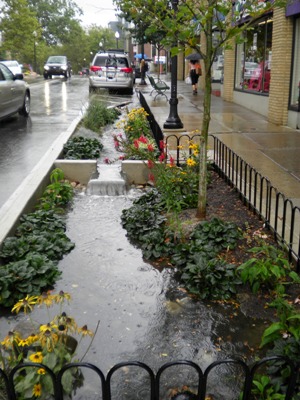How Canadian Municipalities Can Fund Their Stormwater Services

Example of low impact development (LID) stormwater management
Municipalities across Canada are increasingly looking to stormwater user fees as a way to provide dedicated and sustainable funding for stormwater infrastructure and services. Many stormwater budgets are funded through property taxes, which must also fund many other important municipal services, resulting in uncertain financial allocations for stormwater services from year to year.
Furthermore, property taxes are based on property value, which does not typically correlate with the amount of pressure a property places on the stormwater system. As a result, municipalities are struggling with budget shortfalls to fund the construction and maintenance of stormwater infrastructure. Such underfunded services can include the construction and maintenance of stormwater management ponds, low impact development, storm sewers and pipes, watercourse inspections and erosion control, and pollution prevention.
In order to surmount these funding barriers and adopt a more fair system of payment for stormwater services, municipalities are developing and implementing stormwater charges or user fees. Typically, stormwater user fees are based on the amount of impervious surface found or expected on a property,as the impervious surface is a more accurate indicator of how much a property utilizes the stormwater system.
Additionally, the funds collected through a user fee are dedicated to stormwater infrastructure and services, providing increased certainty of funding for both capital and operating budgets. User fee structures can vary depending on the needs, resources, and characteristics of a municipality. Many stormwater user fee programs also include stormwater credit programs, rebates for low impact development, or other incentives to encourage property owners to implement stormwater best management practices.
Developing a stormwater user fee requires an assessment of municipal stormwater budget needs, the technical and staff resources available for program development and administration, as well as the dynamics and preferences of residents, business owners, and other stakeholders. Developing a stormwater user fee also requires providing support and education to elected officials, other relevant municipal departments and staff, as well as the community, to ensure understanding of the purpose of a new funding mechanism for stormwater services. A stormwater charge can also create an outreach opportunity to educate the public about the role and importance of stormwater infrastructure in their community.
In Canada, approximately two dozen municipalities have implemented stormwater user fee programs to fund their infrastructure needs. Such municipalities include Mississauga, Kitchener-Waterloo, Newmarket, London, Ottawa, Victoria, Halifax, Saskatoon and others, with many more municipalities currently exploring user fees or in the process of developing them. User fee programs can, and should, be tailored to the needs of their municipalities and user fee programs in Canada are as diverse as the communities that utilize them, ranging from flat fees for different property types to individualized assessments of all the impervious surface on every property.
Municipalities that have implemented stormwater user fees have been rewarded with more certainty in their stormwater budget, increased resources to address important stormwater infrastructure needs, a fairer system of charging properties for stormwater services, and a community that is more prepared for extreme weather.
To stay up-to-date with the latest STEP news, publications and training opportunities, including any upcoming training related to stormwater financing and user fees, subscribe to the “STEP Water Sampler” e-newsletter at sustainabletechnologies.ca/newsletters. For a complete list of all training opportunities currently available visit sustainabletechnologies.ca/events.
